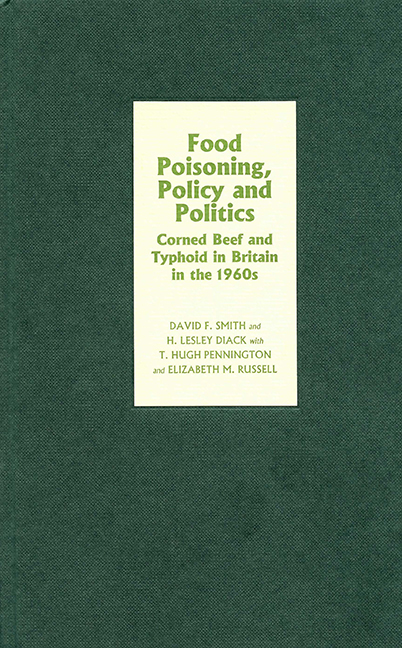Book contents
- Frontmatter
- Contents
- List of illustrations
- Preface and acknowledgements
- Abbreviations used in text
- Abbreviations used in footnotes
- 1 The earlier history of typhoid and food poisoning
- 2 The 1963 corned beef-associated typhoid outbreaks in Harlow, South Shields and Bedford
- 3 The Aberdeen typhoid outbreak
- 4 The medical officer of health, the media and the public in the Aberdeen typhoid outbreak
- 5 Ministers, officials and the Aberdeen typhoid outbreak
- 6 The Milne Committee of Enquiry
- 7 The recommendation on the inspection of overseas meat plants: the roles of existing policy agendas, and interdepartmental and inter-professional tensions
- 8 The disposal of suspect canned meat: the priority of politics over technical advice
- 9 British action to encourage improvements in Argentine meat hygiene, 1964 to 1969
- 10 Summary and conclusions, and food safety since 1964
- Appendix: Recommendations of the Milne Committee
- Bibliography
- Index
Appendix: Recommendations of the Milne Committee
Published online by Cambridge University Press: 24 October 2017
- Frontmatter
- Contents
- List of illustrations
- Preface and acknowledgements
- Abbreviations used in text
- Abbreviations used in footnotes
- 1 The earlier history of typhoid and food poisoning
- 2 The 1963 corned beef-associated typhoid outbreaks in Harlow, South Shields and Bedford
- 3 The Aberdeen typhoid outbreak
- 4 The medical officer of health, the media and the public in the Aberdeen typhoid outbreak
- 5 Ministers, officials and the Aberdeen typhoid outbreak
- 6 The Milne Committee of Enquiry
- 7 The recommendation on the inspection of overseas meat plants: the roles of existing policy agendas, and interdepartmental and inter-professional tensions
- 8 The disposal of suspect canned meat: the priority of politics over technical advice
- 9 British action to encourage improvements in Argentine meat hygiene, 1964 to 1969
- 10 Summary and conclusions, and food safety since 1964
- Appendix: Recommendations of the Milne Committee
- Bibliography
- Index
Summary
In the light of our findings we have felt it desirable to make a number of recommendations. Briefly these are as follows:
That the hygienic requirements to be observed by establishments exporting meat and meat products to this country should be set out in as clear and detailed a manner as possible and should contain a requirement that all water used in such an establishment which is likely to come into contact with the product should conform to a minimum bacteriological standard of purity. We understand that this recommendation is now being implemented.
That the personnel presently employed in the inspection of canning establishments abroad should be augmented and that any inspection team, particularly at the time of a first visit, should also include a medical officer.
That consideration should be given to suggesting to the Food and Agricultural Organisation of the United Nations the setting up, under the auspices of the International Codex Commission, of a system of inspection for all establishments engaged in the manufacture for export of meat and meat products.
That the present division of responsibility between the Ministry of Health and the Ministry of Agriculture, Fisheries and Food so far as meat and meat products are concerned should be revised with regard to the point at which responsibility passes from one department to the other.
That the powers available to medical officers of health to close premises in which infection may exist should be re-examined to consider whether strengthening of the present powers is desirable.
That there should be prepared in consultation with the trade a code of practice on the hygienic handling of cold cooked meats in retail establishments.
That the Food Hygiene Regulations should be amended as soon as may be considered practicable to ensure that where cold cooked meat is displayed for sale the temperature in such a display should not exceed 40°F.
The law whereby a medical officer of health has power to examine a person whom he has reason to believe may be suffering from infectious disease should be extended to cover persons who may reasonably be suspected of carrying infectious disease.
- Type
- Chapter
- Information
- Food Poisoning, Policy and PoliticsCorned Beef and Typhoid in Britain in the 1960s, pp. 310 - 311Publisher: Boydell & BrewerPrint publication year: 2005



